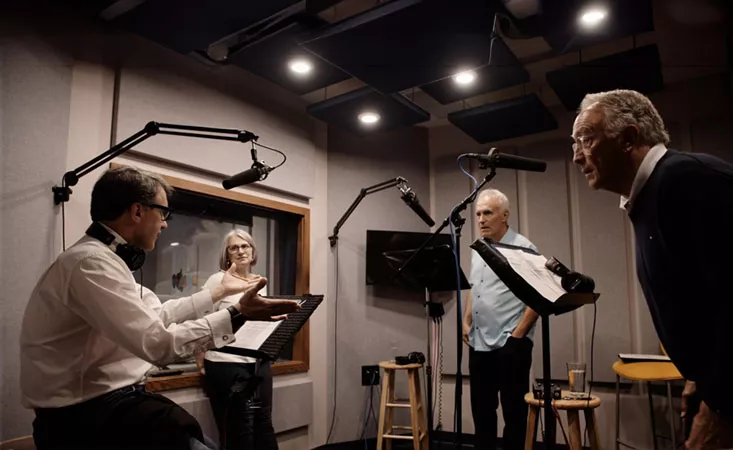
Host John Hallberg, MD, and guests record an episode of the podcast series “First Line of Defense.”
A new podcast series aims to educate primary care providers about the risk factors and symptoms commonly seen before a diagnosis of pancreatic cancer. The goal of this podcast, titled “First Line of Defense: Primary Care Clinicians and the Early Detection of Pancreatic Cancer,” is to help healthcare professionals continue to detect the disease early and increase patient survival rates. to provide a comprehensive education.
Dr. Barbara Kenner, a PanCAN board member and founder of the Kenner Family Research Fund, calls this group of clinicians the “gatekeepers of the disease.” This is because they are usually the first point of contact for people experiencing symptoms such as back pain. Digestive problems are often misdiagnosed and sometimes ignored in patients who are later diagnosed with pancreatic cancer.
Barbara lived through this experience when her husband Peter sought help for symptoms that turned out to be pancreatic neuroendocrine tumors (PNETs). He passed away in 2010, just two months after his diagnosis.
After his death, she wanted to understand what could be done to diagnose patients earlier.
“I started looking at the literature,” she said. “And over the years, I started seeing all the evidence of lower back pain, abdominal pain, fatigue, weight loss, and a new diagnosis of diabetes.”
When she spoke with Peter's internist, he encouraged her to dig deeper into her research and find a way to contact a clinician.
“He said to me, 'Go out and find a way to catch this disease early.' You need something in your toolbox.”
For many years, the Kenner Family Research Fund (KFRF) has hosted conferences and workshops that bring together researchers and medical professionals to share knowledge about pancreatic cancer. Barbara also serves on the steering committee for the PanCAN Early Detection Initiative, a study investigating the association between new-onset diabetes and pancreatic cancer. Julie Fleshman, JD, MBA, President and CEO of PanCAN, said Barbara's long-standing commitment to improving outcomes for patients with pancreatic cancer continues to make a difference.
“We are so inspired by the passion that our board members bring to this cause,” she said. “Barbara is a great example. This is groundbreaking research reaching clinicians that could change the course of this disease for many patients.”
For Barbara, the podcast series is the next evolution of the Kenner Family Research Fund, which focuses on early detection. Why a podcast? That's because research shows that podcasts are one of the fastest growing ways to provide medical information to medical practitioners. Barbara laughed and said he was “not a podcast expert,” but he quickly partnered with the right people. Social Her Media Her daughter, who works in marketing, introduced her to the nonprofit organization Entertainment 2 Affect Change (e2ac). They recognized the importance of the work and enthusiastically supported the project.
“We knew there were different categories we wanted to cover,” Barbara says. “In the first episode, we wanted to focus on just the symptoms and risk factors, isolate that, and let clinicians know what their next steps should be. Next, genetics and family We wanted to focus on history because even though only about 10% of pancreatic cancer cases have a familial or genetic link, it is an identifiable group that may be at higher risk. ”
From there, the series moves to the future of early detection of pancreatic cancer and how technology may play an increasingly important role in diagnosis. The final episode features an interview with Dr. Chris Sander, a computational biologist and researcher focused on using artificial intelligence to more accurately predict pancreatic cancer.
The series' host, John Hallberg, MD, is a renowned medical podcast host and family physician, which is exactly the combination KFRF was looking for to guide the conversation.
Patient voices are also incorporated into the episodes. Brothers Steve and Scott Nelson share how Scott's pancreatic cancer diagnosis and his family history of BRCA2 mutations led Steve to get tested regularly. As a result, Steve caught his pancreatic cancer early and underwent successful surgery, showing that his early detection was worth saving lives.
The research team hopes to explore more topics, including how race, ethnicity, and socioeconomic factors are related to early detection of pancreatic cancer. For example, we know that black Americans are more likely to be diagnosed with pancreatic cancer than any other race or ethnicity, but we don't yet know what causes this difference. Factors related to systemic racism, the environment, access to nutritious food, and barriers to quality health care may play a role.
“It's important for primary care physicians to understand that these differences exist. The bigger issue is awareness,” Barbara says.
Raising awareness is key to achieving the ultimate goal of reducing the number of people diagnosed with late-stage pancreatic cancer. The earlier more people are diagnosed, the more likely they are to survive. There is currently evidence that patients with early-stage or localized pancreatic cancer are living longer with available treatments. The 5-year survival rate for localized disease is more than 44%, compared with only 3% for patients diagnosed with distant disease. Unfortunately, only 13% of pancreatic cancers are localized.
“How can we reduce the number of people who are diagnosed late and reduce the number of people who get pancreatic cancer once it's treatable?” asked Barbara. “We need to reach out to the gatekeepers, primary care clinicians, to raise awareness of the risk factors and subtle symptoms associated with this disease.”
Spread the word about this new resource for health professionals. Listen to the podcast series wherever you get podcasts, and consider sharing the episodes with your doctor.

